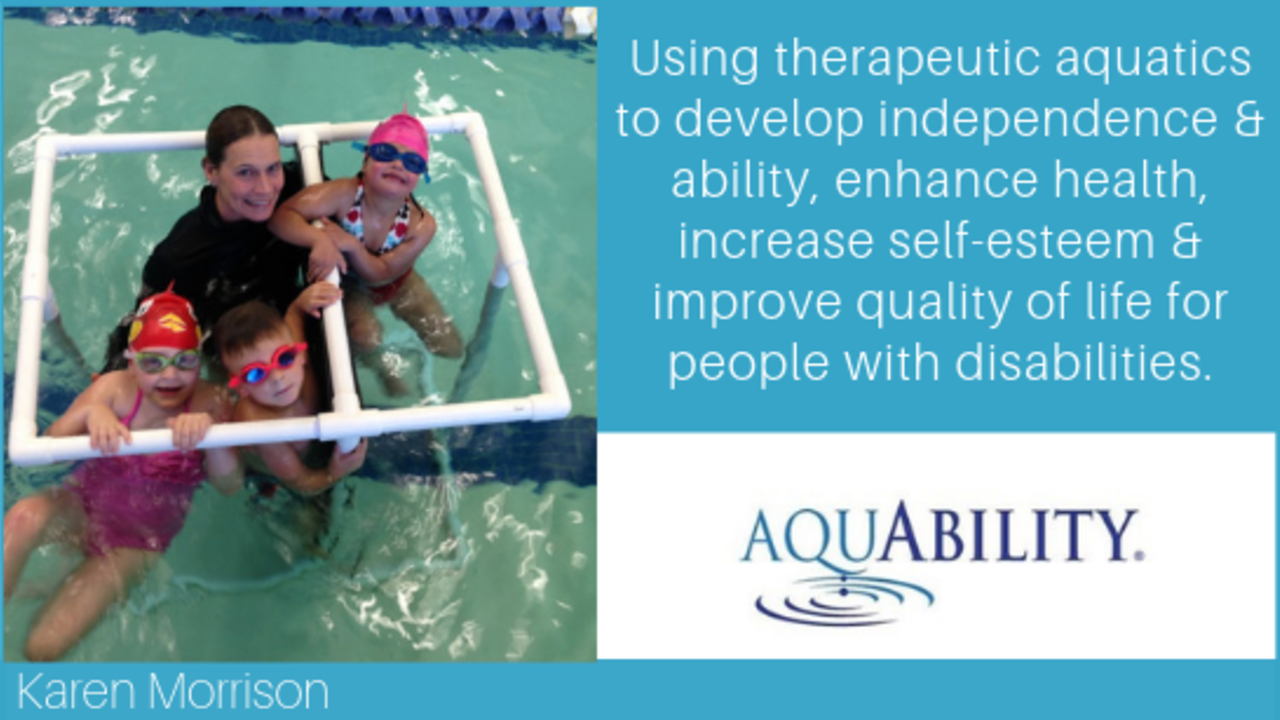Inspiring Woman on a Mission: Karen Morrison
May 10, 2019
Water can transform.
In the water, you can be almost 90 percent lighter. Water provides a natural resistance that allows you to stretch your muscles and get a workout without straining your joints. The buoyancy lets you practice your balance without fearing a fall. Floating feels like freedom. And in the pool, you can often do things you might not be able to do on dry land.
Karen Morrison knew of all of this before she founded AquAbility in 2010. She had worked for years as a swim instructor, coach and personal trainer, helping people improve their strength and conditioning.
But the power of water to transform truly revealed itself to Karen when she took on a client who had suffered a traumatic brain injury. Amanda, once a multi-sport competitive athlete at an elite college, now could not move the left side of her body.
They began to work together in a pool, where Amanda could achieve a range of motion and ability not available to her out of the water. Amanda discovered swimming and together they developed a technique that allowed her to swim only using her right arm and leg. She got good at it; and then her competitive instinct kicked in.
Amanda didn’t just want physical therapy; she wanted to train like an athlete. She didn’t just want to swim; she wanted to compete. Karen took Amanda from Ketchum, Idaho to San Antonio, Texas, to participate in the National Paralympic Swim Meet.
That day, Karen saw the various equipment and devices that are part and parcel of being disabled cast aside – wheelchairs, crutches, prosthetic limbs. More importantly, she saw people having fun in the pool, feeling good about their bodies. They were celebrating their abilities and what they could do in the water.
“I got home and said I want to start a nonprofit and do this all the time,” Karen said.
For the past decade, AquAbility has provided therapeutic aquatic programs to children and adults who are challenged by a variety of disabilities, including paralysis, stroke, Parkinson’s disease, visual or auditory impairment, multiple sclerosis, cerebral palsy, amputation, spinal cord injury, brain injury, Down Syndrome, spina bifida, autism, and developmental disabilities. There are participant fees, and the organization also offers scholarships to make the programs more accessible.
Last year alone, they provided more than 5,000 one-on-one training sessions and there is a waiting list to join the program.
The aquatic sessions are tailored to the individual and learning to swim is often a by-product of the program, not the end goal. For children with autism, the purpose of AquAbility might be providing a safe space where the child allows you to touch him or her. For amputees, it could be increasing range of motion or compensating for a lost limb. For those with developmental disabilities, communication skills or learning to follow instructions might be the main objective.
The nonprofit’s programs for veterans and active members of the Armed Forces with disabilities helps vets during their initial recovery and rehabilitation period, provides them with skills and a program to continue their aquatic exercise, and also gives them a social environment and camaraderie.
AquAbility has grown dramatically in the past decade. After starting in Ketchum, the nonprofit began working at the Idaho School for the Deaf and Blind and then expanded to Boise State University. They have an Early Childhood program in Eagle, and the newest program is in Cascade. The goal is to bring it to several more communities in Idaho, as funding and pool availability allows (one of the biggest challenges, Karen said, is finding indoor pools in Idaho).
Originally a one-woman operation, AquAbility now has a staff of three and almost 20 part-time swim instructors, all certified in therapeutic aquatics.
But its influence doesn’t stop at the state’s borders.
Karen created the certification course for Therapeutic Aquatics for People with Disabilities and helps train others to bring the benefits of aquatic therapy to their communities. Karen is a course provider for Aquatic Therapy and Rehabilitation Institute. In addition to certification courses in Idaho, she and her team have traveled to other states and in 2015 and 2017, Karen was selected to be part of an international exchange that brought multiple adaptive sports programs to Chiang Mai, Thailand.
You can learn more about AquAbility here and I also encourage you to visit their Facebook page, where you can see from their numerous videos how water is transforming the lives of many with disabilities.
Are you a Woman on a Mission? A #ChangeMaker working hard to make the world a kinder, brighter place for those in need? I'd love to share your story.
All you have to do is fill out this form and share with me your vision, your mission, your journey and the impact you're making through the work of your small nonprofit. I'd love to feature you as a Woman on a Mission AND bring a little more attention to your good work with a little marketing love!


